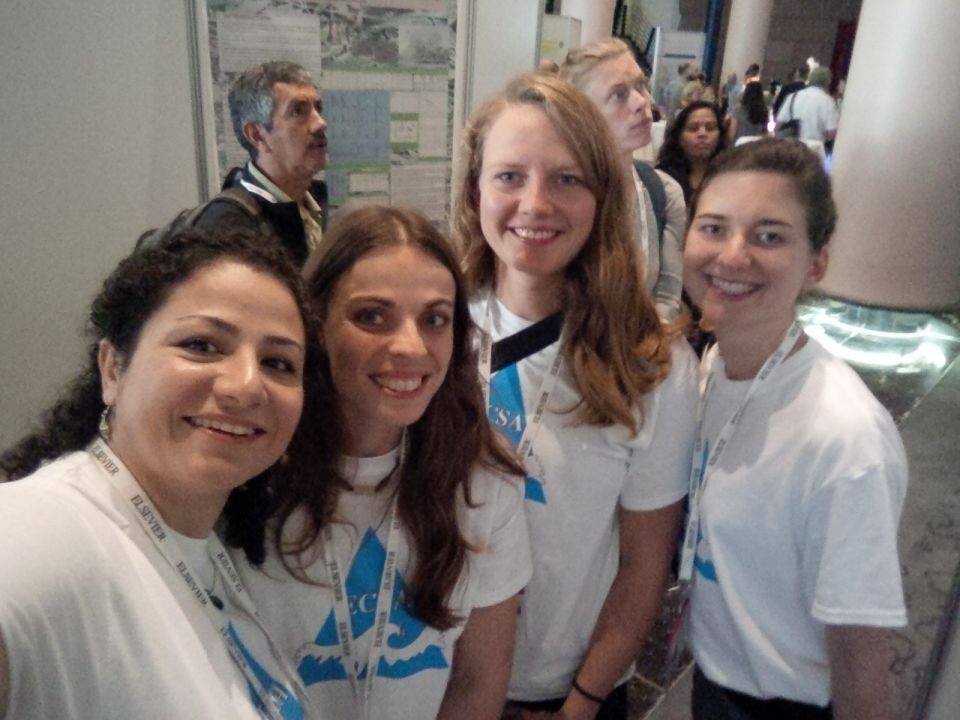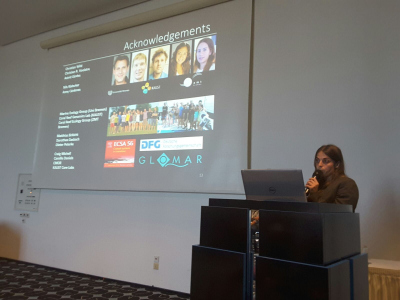Page path:
- Graduate School GLOMAR
- PhD student reports
- Conference Reports
- Conference Reports 2016
- Claudia Pogoreutz
Claudia Pogoreutz
Report of GLOMAR PhD student Claudia Pogoreutz about her participation in the Estuarine and Coastal Sciences Association Conference in Bremen, Germany from 4 - 7 September 2016
The ECSA Symposium is a major conference hosted by the Estuarine, Coastal and Shelf Science Association (ECSA) that has in recent years been held on an annual base. The theme of the 56th meeting was the influence of anthropogenic impacts on sensitive coastal ecosystems, and therefore highly interesting for a broad marine science audience. This meeting was conveniently hosted in Bremen, the conference chairman being Dr. Tim Jennerjahn of the Leibniz Center for Tropical Marine Ecology (ZMT). The ECSA56 attracted more than 500 attendants from 48 countries, who cumulatively presented 300+ talks and 200+ posters. Of course, the coordination of such a big event requires considerable manpower. Therefore, a bunch of student ambassadors of ZMT and the University of Bremen were recruited to assist in all kinds of tasks to ensure smooth conference operation. In return, the students were welcome to submit abstract contributions covering their own research in one of the many exciting sessions.
As I am rapidly approaching the end of my PhD term and my budget is therefore pretty much exhausted, I was glad for the opportunity to join the student ambassador team and to attend this important coastal ecology meeting. After 3 days of assisting the cheerful conference orga team, presenters, and chairs (I was mostly, but by far not exclusively engaged in being an audio technician in a bunch of sessions!) and conducting a marathon of ECSA ‘business tweets’ whenever possible, it was finally time for me to present some of the central results from my PhD work in the Session "Stress Responses: From the Molecular to the Ecosystem Level". This session brought together a series of exciting talks, several of which were particularly interesting for me due to their scope on nutrient cycling in general and nitrogen transformations in specific. Being the second to the last talk of the general sessions, I was rather delighted to still have a rather sizable crowd attending my presentation.
While the conference had only a handful of contributions on coral reef ecology, I was more than happy to learn more about other major coastal ecosystems (particularly seagrass ecosystems and estuaries), as well as on biogeochemical cycles. I was particularly excited about the many high-quality key note talks covering a range of fields represented at the ECSA56 on the first and last talks of the conference. I would like to particularly highlight the stimulating talk by Dr. Robinson Fulweiler (Boston University) on anthropogenic impacts on the global nitrogen cycle, as well as the engaging lecture by Dr. Frank Oliver Glöckner (MPI for Marine Microbiology) on the importance of citizen science in marine microbiology.
Finally, the ECSA56 was a great opportunity to catch up with acquaintances and friends from my undergrad time, as well as with collaborators from the King Abdullah University for Science and Technology (KAUST).
Being engaged with a small aspect of conference organization as a student ambassador was a great and nurturing experience (and I promise I will never ever complain anymore about having to show up for a conference at 8 am!). I would like to express my gratitude to Dr. Tim Jennerjahn and the ECSA56 committee for the opportunity to join the student ambassador team and to present my own research at this exciting meeting.
As I am rapidly approaching the end of my PhD term and my budget is therefore pretty much exhausted, I was glad for the opportunity to join the student ambassador team and to attend this important coastal ecology meeting. After 3 days of assisting the cheerful conference orga team, presenters, and chairs (I was mostly, but by far not exclusively engaged in being an audio technician in a bunch of sessions!) and conducting a marathon of ECSA ‘business tweets’ whenever possible, it was finally time for me to present some of the central results from my PhD work in the Session "Stress Responses: From the Molecular to the Ecosystem Level". This session brought together a series of exciting talks, several of which were particularly interesting for me due to their scope on nutrient cycling in general and nitrogen transformations in specific. Being the second to the last talk of the general sessions, I was rather delighted to still have a rather sizable crowd attending my presentation.
While the conference had only a handful of contributions on coral reef ecology, I was more than happy to learn more about other major coastal ecosystems (particularly seagrass ecosystems and estuaries), as well as on biogeochemical cycles. I was particularly excited about the many high-quality key note talks covering a range of fields represented at the ECSA56 on the first and last talks of the conference. I would like to particularly highlight the stimulating talk by Dr. Robinson Fulweiler (Boston University) on anthropogenic impacts on the global nitrogen cycle, as well as the engaging lecture by Dr. Frank Oliver Glöckner (MPI for Marine Microbiology) on the importance of citizen science in marine microbiology.
Finally, the ECSA56 was a great opportunity to catch up with acquaintances and friends from my undergrad time, as well as with collaborators from the King Abdullah University for Science and Technology (KAUST).
Being engaged with a small aspect of conference organization as a student ambassador was a great and nurturing experience (and I promise I will never ever complain anymore about having to show up for a conference at 8 am!). I would like to express my gratitude to Dr. Tim Jennerjahn and the ECSA56 committee for the opportunity to join the student ambassador team and to present my own research at this exciting meeting.




